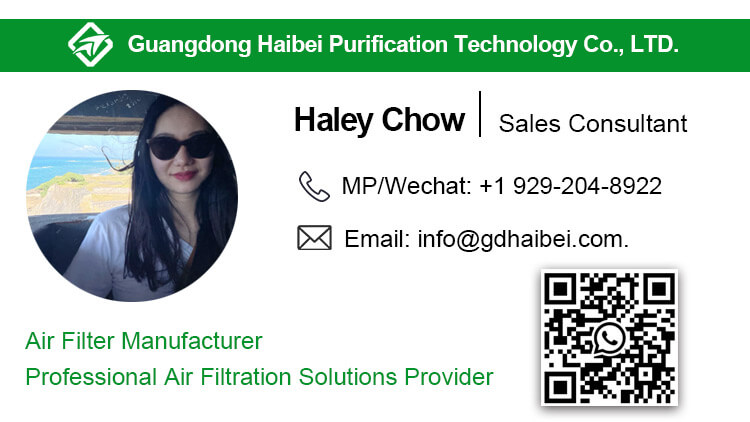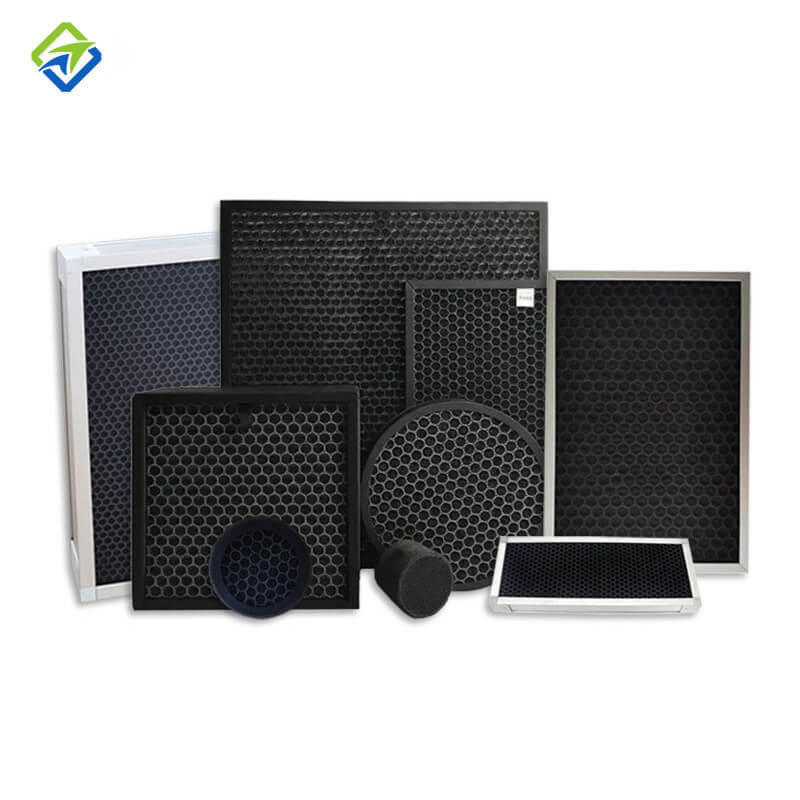Without a doubt, activated carbon air filter is the 'enhanced version' of air filters. Unlike regular filters that can only intercept dust and particles, activated carbon excels at adsorbing invisible harmful substances in the air, making it one of the core components of high-performance air purification equipment. Whether for home, office, or industrial use, air filters equipped with activated carbon can address indoor air filtration issues that are often overlooked by regular air filters.
1. How does an activated carbon filter work in an air filter?
Activated carbon is often made from one of several raw materials such as coconut shells, coal, or wood. After high-temperature activation treatment, it forms a porous structure. This porous structure acts like a 'magnet' for gas molecules: when air flows through the air filter, volatile organic compounds (VOCs), odors, and harmful gases (such as formaldehyde, benzene, and ammonia) are absorbed into the pores of the activated carbon, while the filtered fresh air is smoothly released.
Warm reminder: Activated carbon targets gaseous pollutants, while HEPA filters target particulate matter (PM2.5, pollen, dust mites). For comprehensive purification, most high-quality air filters use a 'activated carbon + HEPA' dual-layer design — which is also what we recommend to our customers: activated carbon HEPA composite high-efficiency filter.
2. Advantages of Activated Carbon Air Filters.
① Removes Odors.
In daily life, odors from cooking fumes, pet smells, cigarette smoke, mustiness from basements, etc., are difficult for ordinary air filters to eliminate. Adding an activated carbon filter will directly adsorb these harmful substances.
② Adsorption of harmful substances (VOCs).
Long-term exposure to harmful substances like formaldehyde in everyday life, such as paint, furniture, cleaning agents, and even some fabrics and furnishings, can cause headaches, allergies, and even serious health problems. Our activated carbon air filters utilize high-iodine coconut shell charcoal, which has a higher adsorption capacity for harmful substances than standard charcoal. Third-party laboratory testing shows that in a room of 20 square meters, our activated carbon air filters can reduce formaldehyde concentrations to below the standard within a certain period of time.
③ Chemical-Free Purification.
Unlike air fresheners or chemical sprays, activated carbon air filters work by adsorption, releasing no chemicals. This makes them especially safe for families with infants, pregnant women, or those with respiratory sensitivities.
3. Actual Case: The Application Effect of Activated Carbon Air Filters.
Case 1: The Application Effect of Activated Carbon Air Filters in New Home Renovation
Mr. Li from Beijing, China renovated his new home in 2024. After moving in, his family experienced symptoms such as dry throat and itchy eyes due to formaldehyde emissions from new furniture. He then installed 3 of our activated carbon air filters in the living room and bedroom. After 7 days, a professional air quality test showed that formaldehyde, benzene, and TVOC levels all met national safety standards. 'Finally, I can sleep with the windows closed in winter,' Mr. Li said.
Case 2: The application effect of activated carbon air filters in office buildings.
In an office building in Guangzhou, China, employees had previously complained about "stale air" and "printing odors." The property management replaced the old central air conditioning filters with our specially customized commercial activated carbon filters. A month later, a survey showed that 85% of the employees reported a reduction in odors and more comfortable breathing.
Case 3: Application Effects of Activated Carbon Air Filters in Industrial Workshops
A plastic manufacturing plant in Jiangsu, China, released some pungent odors, such as benzene and toluene, during the production process. They installed our custom industrial-grade activated carbon air filters. After operation, the pungent odors in the workshop were reduced, and professional exhaust gas inspections showed that the concentrations of benzene and toluene had decreased to the minimum. Therefore, the use of these filters not only improved the factory's air quality but also protected the health of the workers.
4. Why choose our activated carbon air filter?
Our activated carbon air filter products stand out with three major advantages:
Premium carbon material: made from natural coconut shell carbon, it has larger pores and a longer lifespan (replaced every 6-8 months, while ordinary activated carbon filters are only 3-4 months).
Optimized filter material structure: using a multi-layer design (primary filter mesh + activated carbon filter mesh + HEPA filter mesh) to intercept particles, odors, and VOCs in one go, a three-in-one solution without the need for multiple devices.
Customized solutions: our factory has strong capabilities, providing air filtration solutions for home, commercial, and industrial levels, also offering customers free air filter design.
5. Frequently Asked Questions about Activated Carbon Air Filters.
Q1: Can activated carbon air filters remove mold?
A1: No — activated carbon can eliminate odors caused by mold spores but cannot remove the spores themselves. If mold removal is needed, we recommend choosing our "HEPA + Activated Carbon" combination filter (HEPA captures the spores, activated carbon removes odors).
Q2: How often should activated carbon filters be replaced?
A2: Home use: Replace every 6-8 months (replace earlier if there are strong odors); Commercial/Industrial use: Replace every 3-6 months (the more frequently it is used, the more often it needs to be replaced).
Ready to Improve Your Indoor Air Quality?
Explore our full range of air filters and find the perfect solution for your needs. If you need assistance purchasing filters or confirming filter size, please call +1 929-204-8922 (9-5 EST Monday-Friday) or email info@gdhaibei.com.









